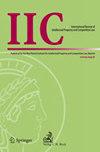知识产权与南非宪法法院:审判策略部署的教训
IF 1.4
Q1 LAW
IIC-INTERNATIONAL REVIEW OF INTELLECTUAL PROPERTY AND COMPETITION LAW
Pub Date : 2023-11-07
DOI:10.1007/s40319-023-01397-6
引用次数: 0
摘要
近日,南非宪法法院在知识产权领域做出了迄今为止的第四次判决。这些决定是在南非有关知识产权的改革和改革建议的背景下作出的。这些改革和改革建议是由于需要建立符合南非当地背景和需要的知识产权法,同时遵守南非的国际条约义务。与南非的政策和立法议程平行,本文承认这四个决定(被称为“知识产权四重奏”)是知识产权法理学的出现。本文分析了知识产权四重奏,并就知识产权与宪法权利之间的交叉以及确定其实际应用的适当方法确定了一种连贯的叙述。本文还解释了这种知识产权法学及其贡献,并考虑了宪法法院在应用宪法条款处理涉及知识产权的问题时所采用的裁决策略。对这些案件产生的法理的解释将:(a)促进对知识产权范围的理解,包括其与宪法条款(特别是南非宪法第2章所表达的基本权利)交叉的适当性质;(b)就解释、概念化和应用知识产权法律框架的适当方法向下级法院和政府行政部门提供一些指导。本文章由计算机程序翻译,如有差异,请以英文原文为准。
Intellectual Property and the Constitutional Court of South Africa: Lessons from the Deployment of Adjudicative Strategies
Abstract The Constitutional Court of South Africa recently handed down its fourth decision so far in the field of intellectual property. These decisions came against the backdrop of reforms and reform proposals concerning intellectual property rights in South Africa. These reforms and reform proposals were prompted by the need to establish intellectual property laws that are attuned to South Africa’s local context and needs, while complying with South Africa’s international treaty obligations. Parallel to South Africa’s policy and legislative agenda, this paper recognises these four decisions (referred to as the “IP quartet”) as the emergence of an intellectual property rights jurisprudence. The paper analyses the IP quartet and identifies a coherent narrative with respect to the intersection between intellectual property rights and constitutional rights and the appropriate approach to determining their real-life applications. The paper also explains this intellectual property rights jurisprudence and its contribution, and considers the adjudicative strategies employed by the Constitutional Court in applying constitutional provisions to dealing with issues involving intellectual property rights. An explanation of this jurisprudence arising from these cases will: (a) promote an understanding of the scope of intellectual property rights including the appropriate nature of their intersection with constitutional provisions (specifically fundamental rights expressed in Chapter 2 of the South African Constitution); and (b) offer some guidance to lower courts and the executive arm of government on the appropriate approach to the interpretation, conceptualization and application of the intellectual property legal framework.
求助全文
通过发布文献求助,成功后即可免费获取论文全文。
去求助
来源期刊
CiteScore
1.90
自引率
30.00%
发文量
127
期刊介绍:
The International Review of Intellectual Property and Competition Law (IIC) is a peer-reviewed academic journal published by the Max Planck Institute for Innovation and Competition. Founded in 1970, IIC is one of the most respected journals in the fields of intellectual property and competition law, presenting contributions with the highest standards of academic research.
IIC publishes research on the most significant developments in IP and competition law from around the world. Our aim is to provide a European perspective on these important topics to an international audience.
The journal adopts a multidisciplinary approach and offers a platform for opposing ideas, providing for rich debate on a host of current IP and competition law issues.
The journal’s central feature is high-quality authored materials including articles, editorials, opinions, reports, case notes and book reviews. We also translate and publish the leading decisions from jurisdictions worldwide, including many non-mainstream jurisdictions.
The quality of IIC is grounded on a more than 50-year history of publication. Each volume builds on this tradition of academic excellence. Our established foundation provides a unique platform upon which our readers are able to research and explore emerging developments in IP and competition law in the decades to come.

 求助内容:
求助内容: 应助结果提醒方式:
应助结果提醒方式:


